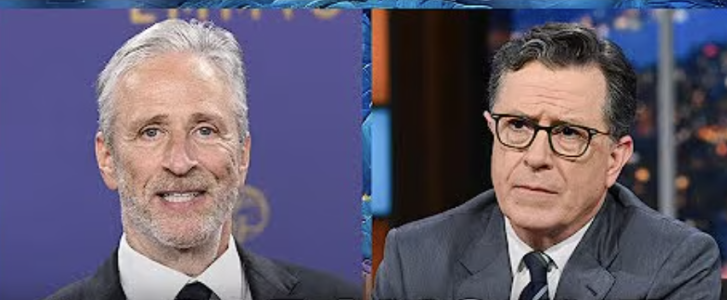Jon Stewart slams CBS after Colbert cancellation: “You are f****g wrong”
By
Veronica E.
- Replies 0
A major shift is underway in late-night television.
CBS has announced that The Late Show with Stephen Colbert will come to an end in May 2026, concluding a program that has been a part of the nightly broadcast landscape for over 30 years.
The news has prompted responses from across the entertainment world, including a direct and critical reaction from comedian Jon Stewart.
As fans reflect on the show’s cultural legacy, the decision has also raised questions about the role of corporate mergers, production costs, and the future of traditional late-night programming.
Here’s what’s behind the decision—and what it could mean for comedy and television in the years ahead.

On his July 22 episode of The Daily Show, Jon Stewart addressed CBS’s decision to cancel The Late Show, calling it a surprising move given the show’s long history and current popularity.
“The fact that CBS didn’t try to save their No. 1 rated late-night franchise that’s been on the air for over three decades is part of what’s making everybody wonder … was this purely financial or maybe the path of least resistance for your $8 billion merger,” Stewart said, referencing the pending merger between Paramount Global and Skydance Media.
Stewart also questioned whether creative risk-taking is being sidelined in favor of corporate interests:
“If you believe as corporations or as networks that you can make yourselves so innocuous, that you can serve gruel so flavorless that you will never again risk Trump’s ire, you are f****ng wrong.”
His comments echoed the concerns of some viewers and industry figures who believe the move could have broader implications for the direction of television comedy.
CBS’s parent company, Paramount Global, is currently seeking approval for an estimated $8 billion merger with Skydance Media.
In announcing the decision to end The Late Show, the company cited financial challenges, including decreased ad revenue and rising production costs—issues affecting many late-night shows as audiences increasingly shift to streaming platforms.
Some critics have drawn connections between the show’s cancellation and recent legal and financial developments.
Paramount Global recently settled a lawsuit with President Donald Trump, agreeing to pay $16 million in relation to a 60 Minutes interview.
Trump also claimed a “side deal” with Skydance CEO David Ellison that could involve CBS broadcasting certain public service content following the merger.
Colbert has been critical of these developments on air.
Stewart also commented, calling the Trump settlement “shameful” and questioning whether external pressures may have played a role in the network’s programming decisions.
Other prominent late-night personalities quickly expressed support for Colbert and concern over the show’s cancellation.
Jimmy Kimmel posted to social media: “Love you Stephen. F**k you (…) CBS.”
Jimmy Fallon, Seth Meyers, and John Oliver also voiced their disappointment and solidarity.
Oliver called the decision “terrible, terrible news for the world of comedy.”
The unified reaction across rival networks highlighted the impact The Late Show has had on the genre—and the sense of community among comedians in an increasingly competitive landscape.
Stephen Colbert joined The Daily Show as a correspondent in 1995, later launching The Colbert Report in 2005.
He took over The Late Show in 2015, becoming the second host after David Letterman.
Over the years, Colbert became known for mixing political commentary with humor, often taking on current events with a blend of satire and sincerity.
His time at The Late Show has been marked by high ratings, numerous award nominations, and a loyal audience.
For many viewers, Colbert’s voice became a trusted part of their nightly routine, especially during periods of political and social upheaval.
Source: Facebook / Extra
The decision to end The Late Show is part of a broader shift in the entertainment industry, where streaming platforms, changing viewer habits, and corporate restructuring are reshaping the late-night model.
While some believe new forms of comedy will emerge, others worry that legacy programs like Colbert’s are being squeezed out by cost-cutting and consolidation.
Industry observers say more changes could be coming.
In the meantime, fans are left to reflect on the legacy of a show that helped define late-night comedy for a generation.
The end of The Late Show marks a significant moment in late-night television and raises broader questions about the future of comedy in a changing media landscape.
As networks evolve, the voices and values behind the laughter remain more important than ever.
Read next: What happened to Wendy Williams? Inside her heartbreaking battle with dementia!

What’s your take on the future of late-night TV? Is CBS making the right call for the times—or losing something irreplaceable? What’s your favorite Colbert moment, and how do you think comedy should evolve in today’s media environment? Share your thoughts with us and help keep the conversation going.
CBS has announced that The Late Show with Stephen Colbert will come to an end in May 2026, concluding a program that has been a part of the nightly broadcast landscape for over 30 years.
The news has prompted responses from across the entertainment world, including a direct and critical reaction from comedian Jon Stewart.
As fans reflect on the show’s cultural legacy, the decision has also raised questions about the role of corporate mergers, production costs, and the future of traditional late-night programming.
Here’s what’s behind the decision—and what it could mean for comedy and television in the years ahead.

Jon Stewart and Stephen Colbert have shared a decades-long friendship, now spotlighted amid CBS’s decision to end The Late Show. Image source: YouTube / The Hill.
Jon Stewart responds on-air to cancellation announcement
On his July 22 episode of The Daily Show, Jon Stewart addressed CBS’s decision to cancel The Late Show, calling it a surprising move given the show’s long history and current popularity.
“The fact that CBS didn’t try to save their No. 1 rated late-night franchise that’s been on the air for over three decades is part of what’s making everybody wonder … was this purely financial or maybe the path of least resistance for your $8 billion merger,” Stewart said, referencing the pending merger between Paramount Global and Skydance Media.
Stewart also questioned whether creative risk-taking is being sidelined in favor of corporate interests:
“If you believe as corporations or as networks that you can make yourselves so innocuous, that you can serve gruel so flavorless that you will never again risk Trump’s ire, you are f****ng wrong.”
His comments echoed the concerns of some viewers and industry figures who believe the move could have broader implications for the direction of television comedy.
Also read: Colbert’s late-night reign concludes in May—network drops hints, but no successor yet
Merger context and financial challenges
CBS’s parent company, Paramount Global, is currently seeking approval for an estimated $8 billion merger with Skydance Media.
In announcing the decision to end The Late Show, the company cited financial challenges, including decreased ad revenue and rising production costs—issues affecting many late-night shows as audiences increasingly shift to streaming platforms.
Some critics have drawn connections between the show’s cancellation and recent legal and financial developments.
Paramount Global recently settled a lawsuit with President Donald Trump, agreeing to pay $16 million in relation to a 60 Minutes interview.
Trump also claimed a “side deal” with Skydance CEO David Ellison that could involve CBS broadcasting certain public service content following the merger.
Colbert has been critical of these developments on air.
Stewart also commented, calling the Trump settlement “shameful” and questioning whether external pressures may have played a role in the network’s programming decisions.
Also read: What’s next for Jimmy Kimmel on Who Wants to be a Millionaire? Find out what’s really happening after 5 years as host!
Support from fellow late-night hosts
Other prominent late-night personalities quickly expressed support for Colbert and concern over the show’s cancellation.
Jimmy Kimmel posted to social media: “Love you Stephen. F**k you (…) CBS.”
Jimmy Fallon, Seth Meyers, and John Oliver also voiced their disappointment and solidarity.
Oliver called the decision “terrible, terrible news for the world of comedy.”
The unified reaction across rival networks highlighted the impact The Late Show has had on the genre—and the sense of community among comedians in an increasingly competitive landscape.
Also read: Johnny Carson's hidden life: A new book reveals the man behind the laughter
A look back at Colbert’s legacy
Stephen Colbert joined The Daily Show as a correspondent in 1995, later launching The Colbert Report in 2005.
He took over The Late Show in 2015, becoming the second host after David Letterman.
Over the years, Colbert became known for mixing political commentary with humor, often taking on current events with a blend of satire and sincerity.
His time at The Late Show has been marked by high ratings, numerous award nominations, and a loyal audience.
For many viewers, Colbert’s voice became a trusted part of their nightly routine, especially during periods of political and social upheaval.
Source: Facebook / Extra
Also read: You won’t believe what’s *really* happening behind the scenes of The Voice finale—Are Kelly Clarkson’s performances fooling fans?
What’s next for late-night television?
The decision to end The Late Show is part of a broader shift in the entertainment industry, where streaming platforms, changing viewer habits, and corporate restructuring are reshaping the late-night model.
While some believe new forms of comedy will emerge, others worry that legacy programs like Colbert’s are being squeezed out by cost-cutting and consolidation.
Industry observers say more changes could be coming.
In the meantime, fans are left to reflect on the legacy of a show that helped define late-night comedy for a generation.
The end of The Late Show marks a significant moment in late-night television and raises broader questions about the future of comedy in a changing media landscape.
As networks evolve, the voices and values behind the laughter remain more important than ever.
Read next: What happened to Wendy Williams? Inside her heartbreaking battle with dementia!
Key Takeaways
- Jon Stewart criticized CBS’s decision to cancel The Late Show with Stephen Colbert, raising concerns about the timing and potential connection to the Paramount–Skydance merger.
- The show, which has run for more than 30 years, is set to end in May 2026 amid reported financial pressures, including lower ad revenue and higher production costs.
- Colbert’s fellow late-night hosts—including Jimmy Kimmel, Jimmy Fallon, Seth Meyers, and John Oliver—have all expressed support and disappointment in response to the announcement.
- The decision comes as Paramount Global faces merger negotiations, legal settlements, and increased scrutiny over the future of traditional late-night programming.
What’s your take on the future of late-night TV? Is CBS making the right call for the times—or losing something irreplaceable? What’s your favorite Colbert moment, and how do you think comedy should evolve in today’s media environment? Share your thoughts with us and help keep the conversation going.






